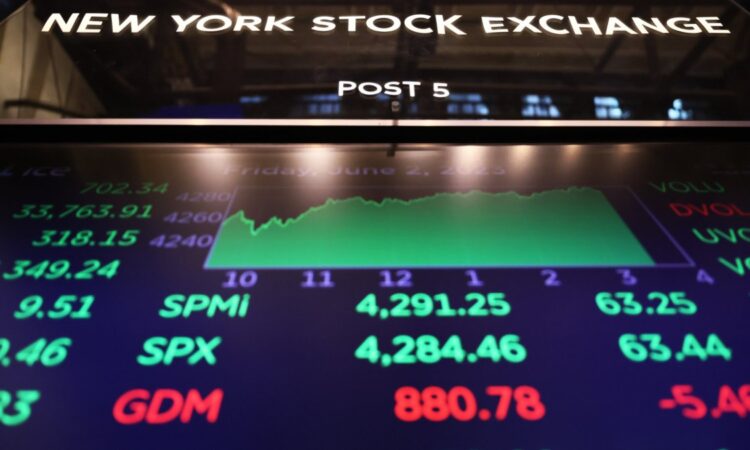Is now a good time to invest? Experts explain what to expect from the stock market if you’re buying shares

Investing can be a daunting prospect, particularly at a time when inflation is high and the economic forecast is uncertain.
However, investing in the stock market is considered one of the best ways to grow your wealth long-term.
UK companies returned an average of 4.7 per cent each year in the decade to 2021 in real terms (after inflation has been taken into account), while US companies returned 12.5 per cent, according to Barclays.
Here’s what you need to know about the markets at the moment, and what to expect if you start buying shares.
What does it mean to invest in the stock market?
The stock market is a collection of “public” companies, which are companies that are listed on a stock exchange.
This stock exchange is where investors can buy and sell shares in these companies from other investors, or in some cases the company itself. Because they are public companies, they have to follow certain rules, such as publishing their financial results.
Is now a good time to invest?
Unfortunately, the short answer is that no-one really knows. It’s nearly impossible to predict any short-term market movements as share prices can be volatile, while knowing the moment when the market may begin a longer downward or upward trend is equally as tricky.
“Investing should not be seen as a get-rich-quick activity, but as a means of building long-term wealth,” said Jason Hollands from the wealth manager Evelyn.
“While share prices can zig zag in the short-term, and from time to time may drop more suddenly, the effect of these will be smoothed out over time for the patient investor.”
There are things you should think about when investing, however. If you are buying individual shares, you should consider the price you are paying.
If the company is “undervalued”, then its share price is likely to return to the right level at some point, meaning the value of the share you own would go up. If a company is considered to be “overvalued”, then the stock is more likely to experience a price fall in the future.
Laith Khalaf from AJ Bell said that it was a tricky time to say where the market stood. The US market fell considerably in 2022 but was still expensive compared to its history, and while stock market valuations in the UK were “much more modest”, it could be down to its exposure to slower-growing stocks like banks and mining companies.
Hollands added: “In truth, tough times — when share valuations are cheap — are usually a great opportunity to invest.”
If you are nervous about investing a lump sum in the stock market, consider “pound cost averaging”. This is where you drip feed your money into investments monthly, which can help smooth out the inevitable bumps in the market as you buy fewer shares when prices are high and more when prices are low.
What returns can you get from the stock market?
It depends. If you had invested in the S&P 500 (an index of some of the US’s largest companies) a year ago, you would have made 2.7 per cent. Over the last five years, you would have made 54 per cent.
Khalaf said that while the stock market didn’t come with any guarantees, it would be reasonable to expect an average of 7 to 8 per cent a year over ten years or more — some years you may lose 10 per cent, but others you could gain 20 per cent.
In the long run, your money should grow more quickly than in savings accounts. For example, £10,000 invested in a 4 per cent savings account would be worth £14,800 after 10 years, but would be worth £19,670 if it grew by 7 per cent a year.
Unfortunately, unlike with cash savings, there is no guarantee, and your investments could go down as well as up.
How do I invest in the stock market?
There are a number of ways to get exposure to the stock market.
You could opt to pick individual stocks — where you choose the companies you invest in yourself — but don’t underestimate the amount of work that comes with this. Many investors read financial reports and analyst notes to truly understand the positives and negatives of a company.
If you want an easier way to invest, you could choose investment funds instead. There are two main types: passive and active.
Passive funds, also known as tracker funds, are cheap investment funds that “track” the performance of a certain market.
You could select a S&P 500 tracker to get exposure to the US and a FTSE 100 version for the UK, for example. If you want access to stock markets across the globe, you can opt for a global fund.
Active funds are run by stockpickers, so experts will pick a smaller amount of stocks for you to invest in, and are usually more expensive. Some will focus on a specific region, so you will need to pick which regions you want exposure to, while again, global funds include companies from various stock markets.
When creating your portfolio, think about diversification. Creating a portfolio with exposure to different asset classes and regions is thought to be the best way to protect your money from serious losses.
“Spreading your eggs instead of having them in one basket reduces the risk of any one stock in the portfolio hurting the overall performance,” said Myron Jobson from Interactive Investor.
“That doesn’t just mean investing in different stocks. It also means having exposure to different sectors, assets and regions.”
What is the best way to invest?
Make sure that any investments you make are held tax-efficiently.
If you are investing for your retirement, invest through your pension — usually a self-invested personal pension — as you get tax relief, and do not pay any dividend tax or capital gains tax. You can pay up to £60,000 into your pension each year.
If you are investing for general savings, use your Isa. All growth is tax-free, and you can pay up to £20,000 into an Isa each year.







